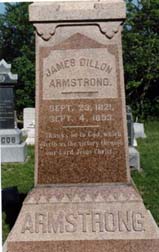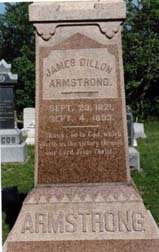He served as a Circuit Judge from 1876 until his resignation in 1892, presiding over the courts in the (then) 4th Judicial circuit (which included Hampshire, Hardy, Grant, Mineral, and Pendleton Counties) with singular ability for the longest period by any judge in Hampshire Co, winning the confidence and the esteem of the people, not only of Hampshire, but of the neighbouring counties and of West Virginia as a whole. His resignation was caused by a long illness - Bright's (kidney) disease - the nature of which prevented him from undertaking long journeys.
He was well liked and respected for his fairness and integrity. Unlike the "Hampshire Review" he backed Cleveland for President, and when his resignation from the Bench freed him from constraint he made a lengthy public speech in his support.
His assets were stated in 1850 to be $400 (year 2000 equivalent $42,882 [c£25,525]) in 1860 $7240 (2000 equiv. $147,841[c£88,000]) and in 1870 (following the Civil War) $1000. In May 1868 he felt compelled to sell his house which was bought by the Revd. William Henry Foote for $2,100 for the future security of his wife and child.
He was an active member of his church, ordained as a Ruling Elder, and was elected its Moderator in April 1870. Session meetings were regularly held in his house during the 1870s and 1880s, and he contributed handsomely towards community projects such as the Potomac Seminary of which he was a Friend and Trustee. At the same time he was elected Superintendent of the Sabbath School.
Probably identical with the James D. Armstrong who from 11th April 1862 took the rank of Major, Assistant Adjutant General, in the Confederate Army. In the Autumn of that year, as a member of the Virginia Senate, he corresponded with the Secretary of War, Confederate States, about handing the control of troops to the Confederate States. This letter was shown to the President, who instructed his Secretary of War to say that he would be happy to accede to the wish of the General Assembly to transfer the State forces, under General Floyd, to the service of the Confederate States, so far as he could do so with a due regard to law. Early in 1862 General "Stonewall" Jackson appointed him Chief of Staff. He accepted but was convinced by the Governor of VA and others that he was of more value in the Senate, so he declined.
He married Ann Waterman Foote on 1st May 1849 in a simple wedding with some forty relations and friends present. She was the daughter of William Henry Foote a Clergyman (Old-Style Presbyterian) and his first wife Eliza Wilson Glasse.
Henry Foote's second wife Arabella G. Foote née Gilliam and her daughter Mary A.G. Foote were living in Romney Hampshire Co. in 1860. In 1870 they were living there with James Dillon Armstrong and his wife Ann at 5 Marsham Street in 1870, and in 1880 on their own at 5 Bolton Street Romney.
In 1884 Judge Armstrong added a Stable block to his house (the previous one boasted an Ice house). That year he and his wife spent the Summer at the seashore. It was also a significant year in the development of the Romney area - Cumberland receiving electric light, and Romney receiving the South Branch railroad and the telegraph, plus a team of official map makers from the Geological Survey 6th Corps. On January 1st, 1889 the Bank of Romney opened up with James Dillon Armstrong as a member of its Board of Directors.
James Dillon Armstrong died 4th September 1893, a year in which they had endured their coldest ever January, with a mean temperature of only 21.6º F., followed by the longest ever drought in the Summer. He was buried at Indian Mound Cemetery, Romney followed by his wife Ann on 26th December 1908 without issue.
He served as a Circuit Judge from 1876 until his resignation in 1892, presiding over the courts in the (then) 4th Judicial circuit (which included Hampshire, Hardy, Grant, Mineral, and Pendleton Counties) with singular ability for the longest period by any judge in Hampshire Co, winning the confidence and the esteem of the people, not only of Hampshire, but of the neighbouring counties and of West Virginia as a whole. His resignation was caused by a long illness - Bright's (kidney) disease - the nature of which prevented him from undertaking long journeys.
He was well liked and respected for his fairness and integrity. Unlike the "Hampshire Review" he backed Cleveland for President, and when his resignation from the Bench freed him from constraint he made a lengthy public speech in his support.
His assets were stated in 1850 to be $400 (year 2000 equivalent $42,882 [c£25,525]) in 1860 $7240 (2000 equiv. $147,841[c£88,000]) and in 1870 (following the Civil War) $1000. In May 1868 he felt compelled to sell his house which was bought by the Revd. William Henry Foote for $2,100 for the future security of his wife and child.
He was an active member of his church, ordained as a Ruling Elder, and was elected its Moderator in April 1870. Session meetings were regularly held in his house during the 1870s and 1880s, and he contributed handsomely towards community projects such as the Potomac Seminary of which he was a Friend and Trustee. At the same time he was elected Superintendent of the Sabbath School.
Probably identical with the James D. Armstrong who from 11th April 1862 took the rank of Major, Assistant Adjutant General, in the Confederate Army. In the Autumn of that year, as a member of the Virginia Senate, he corresponded with the Secretary of War, Confederate States, about handing the control of troops to the Confederate States. This letter was shown to the President, who instructed his Secretary of War to say that he would be happy to accede to the wish of the General Assembly to transfer the State forces, under General Floyd, to the service of the Confederate States, so far as he could do so with a due regard to law. Early in 1862 General "Stonewall" Jackson appointed him Chief of Staff. He accepted but was convinced by the Governor of VA and others that he was of more value in the Senate, so he declined.
He married Ann Waterman Foote on 1st May 1849 in a simple wedding with some forty relations and friends present. She was the daughter of William Henry Foote a Clergyman (Old-Style Presbyterian) and his first wife Eliza Wilson Glasse.
Henry Foote's second wife Arabella G. Foote née Gilliam and her daughter Mary A.G. Foote were living in Romney Hampshire Co. in 1860. In 1870 they were living there with James Dillon Armstrong and his wife Ann at 5 Marsham Street in 1870, and in 1880 on their own at 5 Bolton Street Romney.
In 1884 Judge Armstrong added a Stable block to his house (the previous one boasted an Ice house). That year he and his wife spent the Summer at the seashore. It was also a significant year in the development of the Romney area - Cumberland receiving electric light, and Romney receiving the South Branch railroad and the telegraph, plus a team of official map makers from the Geological Survey 6th Corps. On January 1st, 1889 the Bank of Romney opened up with James Dillon Armstrong as a member of its Board of Directors.
James Dillon Armstrong died 4th September 1893, a year in which they had endured their coldest ever January, with a mean temperature of only 21.6º F., followed by the longest ever drought in the Summer. He was buried at Indian Mound Cemetery, Romney followed by his wife Ann on 26th December 1908 without issue.
Family Members
Advertisement
Explore more
Sponsored by Ancestry
Advertisement










